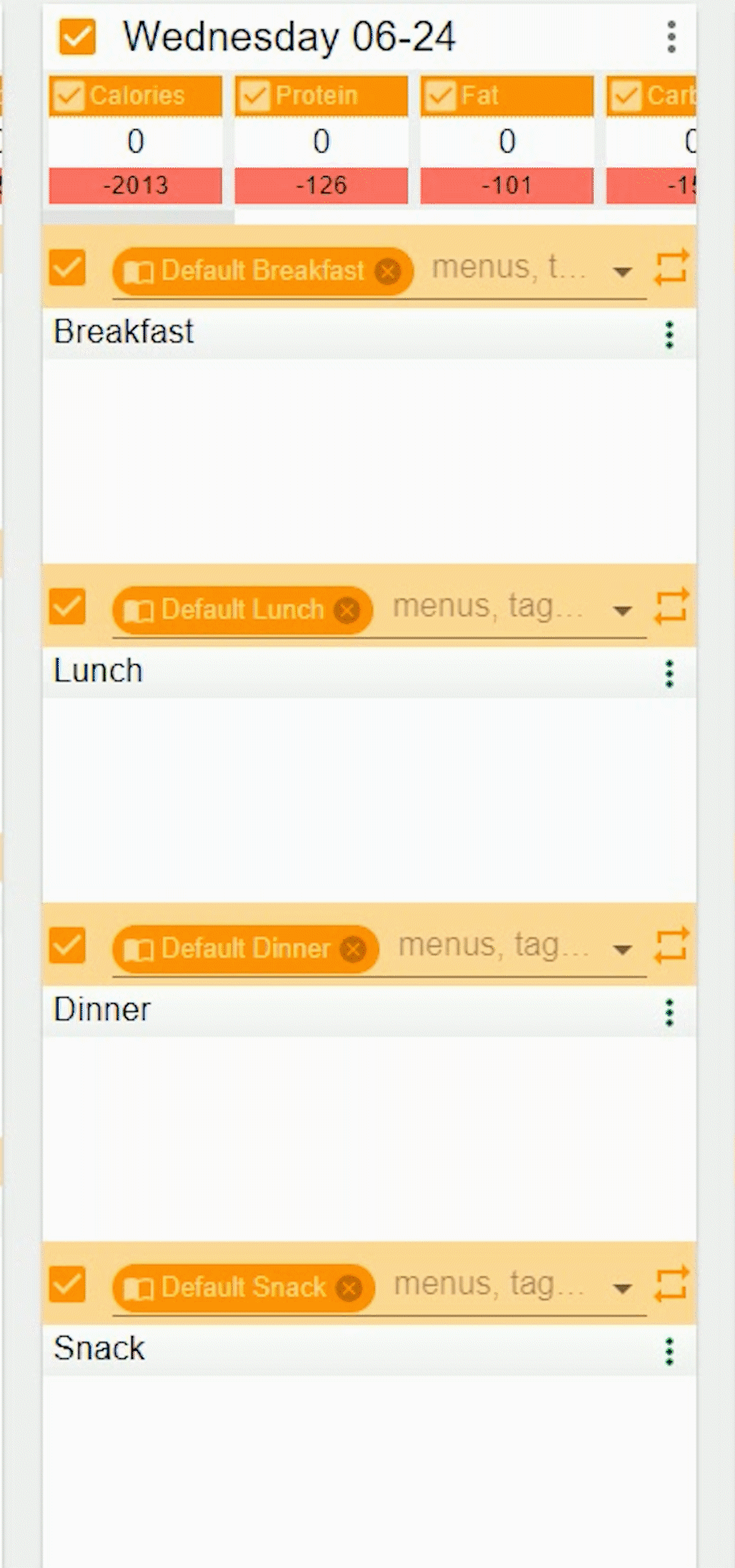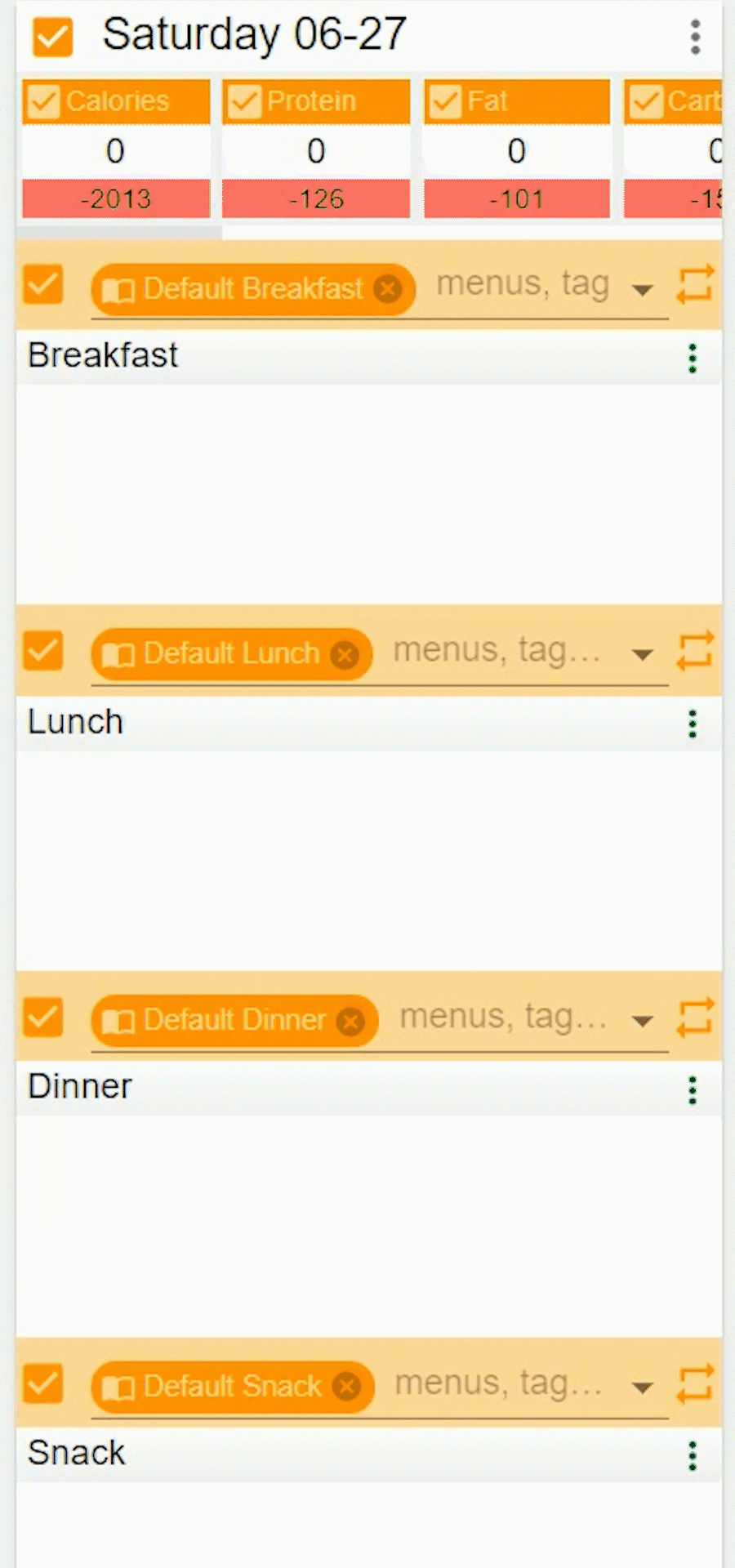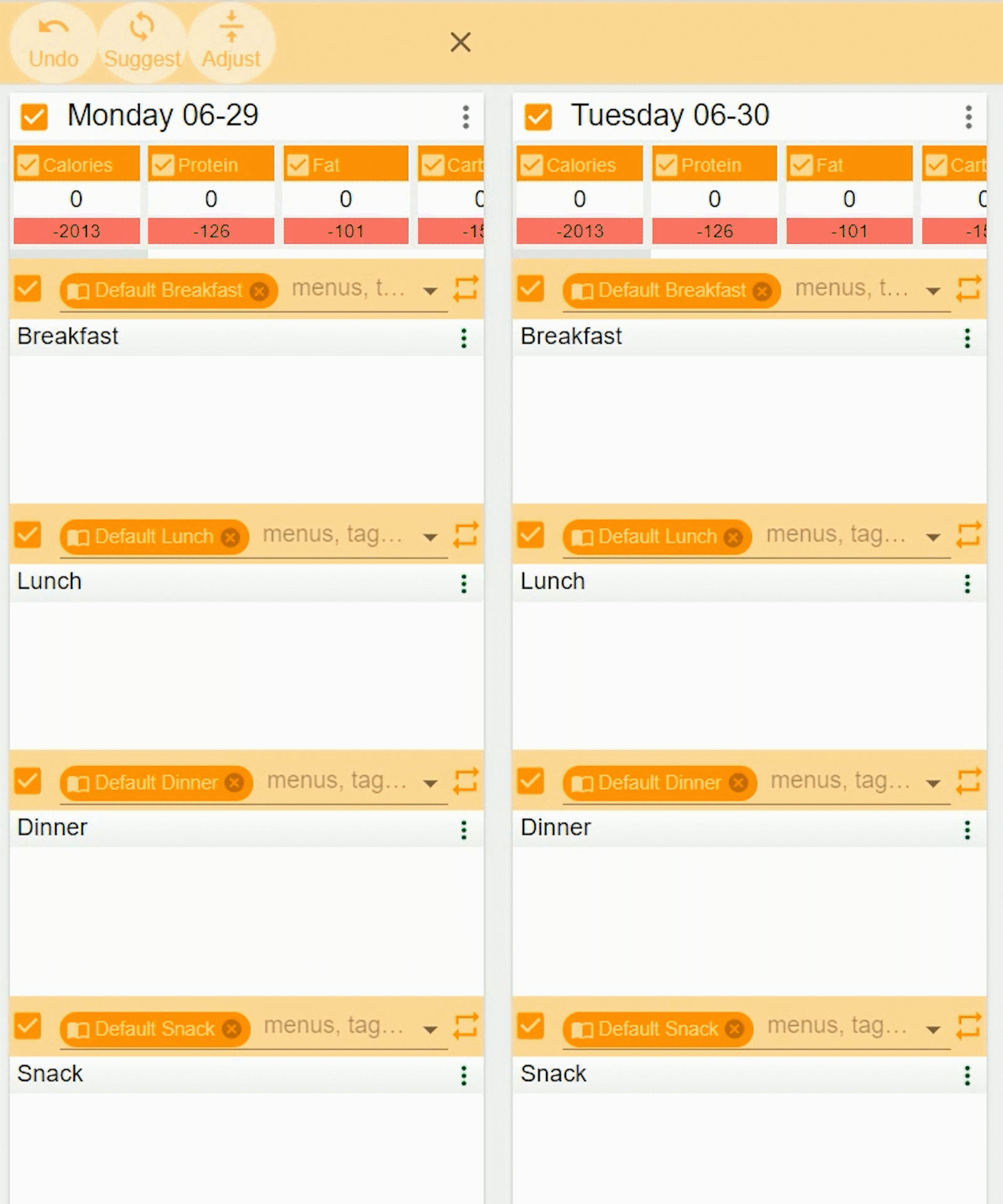PlanYourMeals.com (2017-2020)
A full stack, science-based meal planning webapp
PlanYourMeals was a passion project that grew out of a frustration with the available options (MyFitnessPal, MyFitnessPal, EatThisMuch) for tracking and planning nutrient-precise meals. Eventually, I created a React-frontend, Django-backend web application, powered by a standalone optimization (as in mixed integer programming) service. It has a wide breadth of features:
- Precise meal plans across breakfast, lunch, dinner, and snacks for a single day, multiple days or an entire week
- Ability to search and log meals, then complete the remaining meals to fit the nutrient goals
- Ability to select and deselect nutrients, not just macros, for each solve
- Ability to operate on existing foods and adjust amounts to fit goals
- Ability to switch ‘menus’ per meal, to accomodate restaurant visits, different situations (aka cookouts, cafeterias)
- Search with autocomplete, a drag-and-drop interface, and individual food item modals
- Ability to see all viable alternatives to a food that will still fit within plan
- Ability to undo solves and see all possible solves
- Ability to design ‘whole means’ (such as a quiche) as well as main courses and sides, so that meal plans are realistic
Here are some demos of what implemented:
Single Day Solve

Starbucks for Breakfast, Chipotle For Lunch

Leave Me Leftovers For Lunch The Next Day

The Core Model
I first built an optimization model that would assign integer amounts of realistic serving sizes per food item. The following code sets up a Pyomo modeling object with the following problem. To see how this is implemented in code, see Apendix 1.
Disclaimer: this code was written from 2017 - 2018 and I may not make the same choices today. See full code here
has_dj = False
# Model Create and Index
model = ConcreteModel()
# Indices
access_df = food_df[['access_idx']]
full_I_dict = access_df['access_idx'].to_dict()
access_df.index = access_df['access_idx']
access_df = access_df.assign(full_I=range(len(access_df)))
access_dict = access_df['full_I'].to_dict()
model.access_idx = Set(initialize=access_df.index)
model.full_I = Set(initialize=food_df.index) # used for objective function only
# Params
model.access_idx_lkup = Param(model.access_idx, initialize=access_dict) # To lookup the i based on the access_idx
model.full_I_lkup = Param(model.full_I, initialize=full_I_dict) # To lookup the access_idx based on the i. For parsing solves
# Sub-indeces of Full_I
# Going to loop through meal_idx_tup and use setattr
for tup in meals_idx_tup:
if incl_dict[tup] and tup[1] != 'Snack':
# Setting individual index
setattr(model,tup[0]+"_"+tup[1], Set(initialize=food_df[(food_df['day']==tup[0])&(food_df['meal']==tup[1])].index))
if src_constr_dict[tup]=='sa':
setattr(model, tup[0]+"_"+tup[1]+"_wm",Set(initialize=food_df[(food_df['day']==tup[0])&\
(food_df['meal']==tup[1])&\
(food_df['dish_num']=='Whole Meals')].index))
elif src_constr_dict[tup]=='bd':
setattr(model, tup[0]+"_"+tup[1]+"_mc",Set(initialize=food_df[(food_df['day']==tup[0])&\
(food_df['meal']==tup[1])&\
(food_df['dish_num']=='Main Courses')].index))
setattr(model, tup[0]+"_"+tup[1]+"_si",Set(initialize=food_df[(food_df['day']==tup[0])&\
(food_df['meal']==tup[1])&\
(food_df['dish_num']=='Sides')].index))
else:
setattr(model, tup[0]+"_"+tup[1]+"_wm",Set(initialize=food_df[(food_df['day']==tup[0])&\
(food_df['meal']==tup[1])&\
(food_df['dish_num']=='Whole Meals')].index))
setattr(model, tup[0]+"_"+tup[1]+"_mc",Set(initialize=food_df[(food_df['day']==tup[0])&\
(food_df['meal']==tup[1])&\
(food_df['dish_num']=='Main Courses')].index))
setattr(model, tup[0]+"_"+tup[1]+"_si",Set(initialize=food_df[(food_df['day']==tup[0])&\
(food_df['meal']==tup[1])&\
(food_df['dish_num']=='Sides')].index))
elif incl_dict[tup] and tup[1] == 'Snack':
setattr(model,tup[0]+"_"+tup[1], Set(initialize=food_df[(food_df['day']==tup[0])&\
(food_df['meal']==tup[1])].index))
"""
Model Params
"""
model.amt_ub = Param(model.full_I, initialize=food_df[['max_servings']].to_dict('dict')['max_servings'])
"""
Creating Variables
"""
model.ind = Var(model.full_I, within=Binary)
model.amt = Var(model.full_I, within=NonNegativeIntegers, bounds=(0,food_max))
# Creating Constraints
# Set A Global Big M constraint so that ind is tied to amt
def m(model, i):
return model.amt[i] <= model.ind[i] * global_m
def use_ind(model, i):
return model.ind[i] <= model.amt[i]
model.m_items = Constraint(model.full_I, rule=m)
model.use_m = Constraint(model.full_I, rule=use_ind)
"""
Don't repeat accross days
"""
#for tup in meal_food_tup.itertuples():
for tup in meal_food_tup:
"""
Does not include meals
"""
# print(tup)
# idx = food_df[(food_df['fd_type']=='food')&(food_df['unique_id']==tup[1])].index
# setattr(model, str(tup[1])+"_non_rep", Constraint(expr=sum([model.ind[m] for m in idx])<=tup[2])) # Sets all to '2' which is highly infeasible
idx = food_df[(food_df['meal']==tup[0])&(food_df['fd_type']==tup[1])&(food_df['unique_id']==tup[2])].index
setattr(model, tup[0]+tup[1]+str(tup[2])+"_non_rep", Constraint(expr=sum([model.ind[m] for m in idx])<=2))
"""
Disjunction
"""
for tup in meals_idx_tup: # Can combine with above loop after getting this down
if incl_dict[tup] and tup[1] != 'Snack':
if src_constr_dict[tup]=='sa':
setattr(model, tup[0]+"_"+tup[1]+"_sel_wm",
Constraint(expr=sum([model.ind[m] for m in getattr(model,tup[0]+"_"+tup[1]+"_wm")])==1))
elif src_constr_dict[tup]=='bd':
setattr(model,tup[0]+"_"+tup[1]+"_sel_mc",
Constraint(expr=sum([model.ind[m] for m in getattr(model,tup[0]+"_"+tup[1]+"_mc")])==1))
setattr(model,tup[0]+"_"+tup[1]+"_sel_si",
Constraint(expr=inequality(sides_dict['br']['min'],sum([model.ind[m] for m in getattr(model,
tup[0]+"_"+tup[1]+"_si")]))))
else:
setattr(model,tup[0]+"_"+tup[1]+"_sel_sa",
Disjunct())
setattr(getattr(model,tup[0]+"_"+tup[1]+"_sel_sa"),'c1',
Constraint(expr=sum([model.ind[m] for m in getattr(model,tup[0]+"_"+tup[1]+"_wm")])==1))
setattr(getattr(model,tup[0]+"_"+tup[1]+"_sel_sa") ,'c2',
Constraint(expr=sum([model.ind[m] for m in getattr(model,tup[0]+"_"+tup[1]+"_mc") ])==0))
setattr(getattr(model,tup[0]+"_"+tup[1]+"_sel_sa"),'c3',
Constraint(expr=sum([model.ind[m] for m in getattr(model,tup[0]+"_"+tup[1]+"_si") ])==0))
setattr(model,tup[0]+"_"+tup[1]+"_sel_bd",
Disjunct())
setattr(getattr(model,tup[0]+"_"+tup[1]+"_sel_bd"),'c1',
Constraint(expr=sum([model.ind[m] for m in getattr(model,tup[0]+"_"+tup[1]+"_wm") ])==0))
setattr(getattr(model, tup[0]+"_"+tup[1]+"_sel_bd"),'c2',
Constraint(expr=sum([model.ind[m] for m in getattr(model,tup[0]+"_"+tup[1]+"_mc") ])==1))
setattr(getattr(model,tup[0]+"_"+tup[1]+"_sel_bd"),'c3',
Constraint(expr=inequality(sides_dict[tup[1]]['min'],sum([model.ind[m] for m in getattr(model,
tup[0]+"_"+tup[1]+"_si" )]),sides_dict[tup[1]]['max'])))
setattr(model,tup[0]+"_"+tup[1]+"c",Disjunction(expr=[getattr(model,tup[0]+"_"+tup[1]+"_sel_sa" ),
getattr(model,tup[0]+"_"+tup[1]+"_sel_bd")]))
has_dj = True
elif incl_dict[tup] and tup[1] == 'Snack':
# Snack Amount Constraints
setattr(model, tup[0]+"_"+tup[1]+"_ind_n",Constraint(expr=sum([model.ind[m] for m in getattr(model,
tup[0]+"_"+tup[1])])<=n_snack) )
# Disjunctive Transformation
if has_dj:
trnsfrm = TransformationFactory('gdp.bigm') # Toggle chull bigm
trnsfrm.apply_to(model)
# Amount max
def amt_bounds(model,i):
return model.amt[i] <= model.amt_ub[i]
model.amt_bounds = Constraint(model.full_I, rule=amt_bounds)
# Nutritional bounds
for day in days:
if day in leftover_dict:
setattr(model, day+"_index", Set(initialize=food_df[(food_df['day']==day)|\
((food_df['day']==leftover_dict[day]['orig_day'])&\
(food_df['meal']==leftover_dict[day]['orig_meal']))].index))
else:
setattr(model, day+"_index", Set(initialize=food_df[(food_df['day']==day)].index))
# Will need to also change food_df_dict going forward for different days that already have something planned
# Set Index N
nutrient_df = pd.DataFrame(requirements_dict[day])
nut_cols = list(nutrient_df.columns.values)
setattr(model, day+"_N", Set(initialize=nut_cols))
food_df_dict = food_df[['prob_r']+nut_cols].to_dict('list')
setattr(model, day+"_bounds", Param(getattr(model,day+"_N"), initialize=nutrient_df[nut_cols].to_dict('list')))
def ml_bounds(model, n):
return (getattr(model, day+"_bounds")[n][0], sum([food_df_dict[n][i]* model.amt[i] for i in getattr(model,day+"_index")]),
getattr(model, day+"_bounds")[n][1])
setattr(model, day+"_nutr_bounds", Constraint(getattr(model,day+"_N"), rule=ml_bounds))
# Objective
def tgt_obj(model):
return sum_product(food_df_dict['prob_r'], model.amt, index=model.full_I)
model.obj = Objective(rule=tgt_obj)
This led to a
Learnings
Skills
- Pyomo, CBC, Branch-and-Cut Optimization methods
- Django, Postgresql
- React, Redux and State
- Celery and asyncronous workflows
- Nginx, gunicorn, and Linux hosting (etcd, port management, etc)
- AWS Cloud (EC2, S3, CodeBuild, CodePipeline, VPC’s, Subnets, RDS, etc)
Project-Level
- Appreciation for Frontend
The experience of understanding React modules, the choices for managing state, and how bottlenecked the entire flow was by the frontend was an eye-opening experience and a
-
Data model choices anchor your project, are hard to change
-
Data Categories, Tags and Labels are Crucial
-
Data Science Proejcts are Continuous
Within months of building my POC, I had a backlog of data science-based tasks. Semantic similarity between serving size descriptions. Named entity recognition to parse free text descriptions into ingredient unit, amount and serving size. K-nearest neighbors for similar-nutrient profile recommendations. Image classification or similar search to identify incorrect item thumbnails.
- Good Software Is Not a One-Person Job I wanted to upskill my data science by finding
Conclusion
This project evolved from a desire to dig deeper into Optimization into a part-time obsession with making the best meal planning project. In the end, there wasn’t much of a clamouring for a hyper-precise adpable meal planner. With the arrival of my first daughter, and a new job during the Covid-19 pandemic I decided to simplify my life and step back from the project, investing the additional energy into my full-time job.
I’m happy with that decision, but still proud of the work and the learnings along the way.
Appendix
FAQ’s
Why is the code all added to github at once?
While the code originally was pushed to github, in 2017 I switched to AWS CodeCommit for greater security and CICD integration with AWS native tools. In 2025,